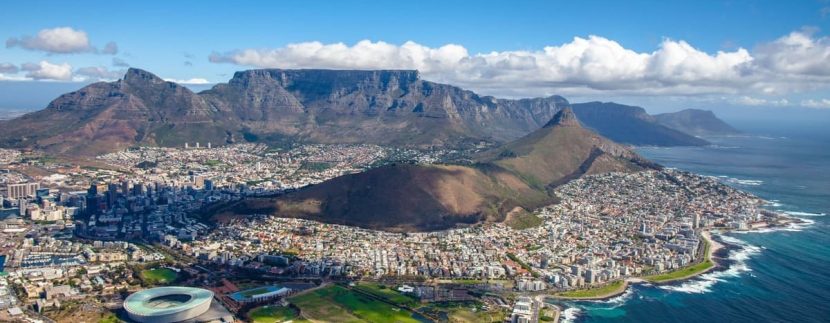Is South Africa Safe to Visit? 5 Things Travelers Need To Know

[ad_1]
Last Updated
South Africa is easily one of Africa’s most accessible countries and best tourist offers, but it may no longer be as safe a destination as it was five or more years ago.
It has surely come a long way since Apartheid, having evolved to be a modern post-racial democracy, going as far as hosting the World Cup in 2010 and being crowned one of Africa’s fast-developing states, but recent events have led experts to believe it has backtracked in its advancements.
Several of South Africa’s cities are reporting high crime levels, some of the highest rates seen in this century; an energy crisis is plaguing most of the country, and inter-communal tensions seem to be rising once more.

With this information in mind, just how safe is South Africa to visit, how have public safety levels deteriorated so significantly, and what are 5 safety tips tourists must keep in mind during their stay?
What Is Happening In South Africa Right Now?
Due to soaring crime, widespread corruption, and an ongoing ‘brain-drain’ that’s causing many of South Africa’s brightest professionals to leave the country en masse in search of better opportunities in Europe or the United States, it now risks becoming a ‘failed state‘.
Failed states are characterized by countries with a fragile democracy, where local leaders are unable to exercise sovereignty over the national territory and doomed by instability.

Some recent examples include the Central African Republic and Somalia, according to the Bertelsmann Transformation Index, and in other charts with broader concepts of what being a failed state means, Haiti and Venezuela.
While South Africa is not currently undergoing a mass exodus of refugees nor descending into full-blown anarchy, experts believe it may not be too far off unless it finds a way out of the deep economic crisis it is in, with a senior official of the African National Congress (ANC) issuing a stark warning.
In the words of Secretary General Finike Mbalula, ‘if certain things are not resolved’, South Africa ‘will become a failed state’.
60% Of South Africans Live Below The Poverty Line
Top 5 Travel Insurance Plans For 2023 Starting At $10 Per Week

He’s listed the recent load-shedding, sometimes as long as 10 hours a day in urban centers, the high levels of corruption, and the shocking unemployment rate of 33%, one of the highest among UN members, as major issues that need urgent addressing.
As recent data suggests, one in two young South Africans are unemployed, while a staggering 60% live under the poverty line, a stark contrast with the late 1990s and 2000s, when South Africa’s economy was booming.
While it is not yet a failed state by any widely-accepted definition, the environment is becoming increasingly more dangerous for both locals and foreign tourists alike.

In Cape Town, South Africa’s trendiest beach destination and a modern, multicultural metropolis that is both bounded by the stunning Sub-Saharan nature and lapped by the azure Atlantic Sea, crime levels have got close to unsustainable, with a local civil rights organization urging a ‘serious intervention‘.
From the disappearance of a 22-year German tourist to the death of a 3-year-old child amid increased gang violence, violent incidents have made headlines for months now.
Previously, South Africa was perceived as a relatively safe haven in a severely under-developed continent and one of its crown jewels.
Now, it is home to the most dangerous city in Africa, an infamous title held by the cosmopolitan Pretoria, the administrative capital, which boasts the highest crime rates in the group.

In the recent study published by experts at 0861 Clearview, a local fencing and security company, we can conclude that five South African cities are now among Africa’s most dangerous.
Pretoria ranks highest with a crime index score of 82, yet it is closely followed by Johannesburg, Durban, Cape Town, and Bloemfontein, the judicial capital.
Armed Robberies And Vandalism
The report notes that ‘corruption and bribery’ are the most common crime in the country, while the city with the most armed robberies and highest rates of assault is Pretoria. Durban, on the other hand, is a hotspot for vandalism and property theft.

Cape Town’s urban issues seem to be related to gang activity and drug usage, and finally, petty crime, as well as violent assault, seem to have become more common in Johannesburg. Both cities are South Africa’s top two tourist destinations.
The situation is so dire Bolt drivers are resorting to creative methods to avoid ‘deadly’ robberies, such as installing SOS buttons and ‘digitally crowd-sourcing’ safety nets of their own in WhatsApp groups. Sadly, these have been to no avail, as danger continues to lurk on some roads.
The U.S. State Department indeed lists ‘smash-and-grab’ attacks on cars as a potential risk for Americans visiting South Africa.

Violence is not the only concern tourists now face when visiting. Power outages are now extremely common, as cable theft is reported in major urban centers like Johannesburg, and serious depredation of cities’ energy infrastructure is carried out by criminal entities.
Blackouts
In the short time span of a year, more than 2,000 energy cables were severed in Johannesburg, leading to widespread blackouts and worsening the country’s energy crisis.
Digital nomads have been among the most affected.
As reported by Alondo Brewington, a remote worker who resided in Cape Town for a number of months earlier this year, outages were so common he had to download an alert app so he could plan his work schedule and daily activities in advance.

Short-term tourists are also affected, as they are often left for hours without internet access or electricity when staying in tourist accommodation without alternative energy sources. The scariest part is: you never know for certain when the power will return or which area criminals will target and raid next.
South Africans themselves are in despair over the Government’s alleged lackluster response and the rising crime.
Murders Are On The Rise Too
More than 7,500 people were murdered in the country between October and December 2022, with over 3,000 dying of gun violence. Other victims were reportedly killed with elements of cruelty, such as ‘bare hands’, sharp objects, and even bricks.

Despite the ongoing crisis, U.S. authorities have extended South Africa’s Level 2 status – so far. This means Americas are not urged to ‘reconsider travel’, nor avoid visiting at all costs, but they must ‘exercise increased caution’ due to crime and civil unrest, especially after dark.
South Africa is no longer as safe as it was a few years back, but it’s important to stress that a majority of visitors fulfill their trips free of harm and return home with nothing but great memories to cherish and a profound love for South Africa and its welcoming peoples.
In an interview with Travel Off Path, Mr. Brewington stated he ‘never felt unsafe walking during the daytime’. He went on to say that the V&A area (in Cape Town) ‘is probably the safest’, as it is well-frequented both when it’s light out and after sundown.

He did reiterate he would be careful walking the downtown area and other non-touristy neighborhoods at night.
Crime rates also vary greatly across neighborhoods, let alone different cities and provinces, so checking local safety advice pertaining to the exact destination within South Africa you are visiting is always advised.
However, as long as you adhere to these 5 tips we are about to give you, you can greatly reduce your chances of being affected by crime traveling anywhere in South Africa:
Keep A Low Profile

The most valuable safety tip for travelers venturing into countries where crime rates are higher – this includes South Africa, but also parts of South America – is avoiding standing out in a crowd and avoiding displaying unnecessary signs of wealth.
While you wouldn’t flash expensive jewelry, wear a Rolex, or get your dollar-stuffed wallet out in central New York either, extra caution is required in cities like Cape Town and Johannesburg, where even using your phone in public can make you easy prey.
Talking informally to Johannesburg locals, we have learned that, other than the general safety advice, they take some extra precautions that wouldn’t necessarily be required in other destinations, such as keeping any valuables hidden, including expensive smartphones such as iPhones, not carrying backpacks as these are targeted by robbers, and avoiding no-go zones.
If you do carry a backpack, you are advised to keep it ‘securely closed’.
Do Not Resist Robbery

The number of tourists who are mugged or affected by crime in any way in South Africa remains moderately low, but should you ever be approached by a robber, do not attempt to run, resist, or ‘be smart’, as you are likely to get hurt, or even risk getting killed.
There is a worryingly high number of assault weapons in circulation in the country, particularly in suburban areas of big cities, and violent criminals are known to not hesitate to use them in robbery attempts.
Besides gun wounds, by resisting, you may also risk getting severely injured by knives or other sharp or blunt objects. The best thing you can do is to slowly surrender your personal items, as instructed by the assailant, and remain reaction-less until they are gone.
Prepare For Load-Shedding

As we have discussed previously, load-shedding has been happening more often than not, and as a tourist in South Africa, you should prepare in advance and avoid being out when power is out and when it’s nighttime.
Downtown Cape Town can be quite dangerous to stroll at night, and that’s when electricity is on. Luckily, there are apps you can now download to prevent being caught off guard or in the wrong place at the wrong time, such as EskomSePush.
It notifies you of potential power cuts set to take place, giving you enough time to make all the necessary preparations ahead of the blackout. Namola is another popular app among locals, enabling them to share their live location with loved ones.
Carry A Secondary ‘Theft’ Phone

Smartphones are valuable items in South Africa, and criminals often prey on tourists who are careless enough to take them out in public on deserted streets, taking selfies, or who are scrolling through their feeds completely oblivious to their surroundings in run-down downtown areas.
Remember, this is not Europe or North America. If you can’t keep your phone in your pocket in risky zones, it is best to have a secondary ‘theft’ phone to surrender to robbers in the event that you are approached.
It is an increasingly common hack not only in South Africa but also in Brazil, Colombia, and other nations in the Global South, as petty crimes continue to rise.
Usually, locals would advise you to either leave your thousand-dollar iPhone at home and carry a ‘cheapy’ mobile when leaving your hotel or tourist accommodation so that if you get robbed, it’s not that big of a deal, or carrying both phones, but keeping your main phone in the pocket at all times and be prepared to hand over the secondary one if needed.
Beware Of Burglars

Criminals have been known to operate during load-shedding periods when security fences and alarms are down, leaving home-stayers and AirBnB guests residing away from the main tourist areas in particularly vulnerable positions.
If you decide on not booking a room in a hotel, and opt for a cheaper Bed & Breakfast or a home stay instead, inquiring about any safety measures undertaken by your host to improve security can help you make a better-informed decision.
A majority of properties in South Africa now have a robust security system to protect residents, such as CCTV, electrified fences, burglar bars, and alarms that will go off to discourage intruders from trespassing, though security may not be as tight in more modest accommodations.
In this case, keeping your valuable personal belongings in a safe, if available, such as passport(s), other documentation, and money, is the smartest move.
Should You Avoid South Africa?

South Africa is one of the most popular tourist destinations in Africa.
Home to stunning natural panoramas, pristine Pacific beaches, and vibrant city breaks, it is surely a country worth exploring.
As long as you stick to the general safety advice and ‘behave like a local’, your risk of becoming yet another victim of crime will be drastically reduced.
You should also make sure you familiarize yourself with South Africa’s troubled past, history of racial segregation, and the nation’s multicultural, multilingual character ahead of visiting.
Traveler Alert: Don’t Forget Travel Insurance For Your Next Trip!
↓ Join Our Community ↓
The Travel Off Path Community FB group has all the latest reopening news, conversations, and Q&A’s happening daily!

SUBSCRIBE TO OUR LATEST POSTS
Enter your email address to subscribe to Travel Off Path’s latest breaking travel news, straight to your inbox.
This article originally appeared on TravelOffPath.com
[ad_2]
Source link






